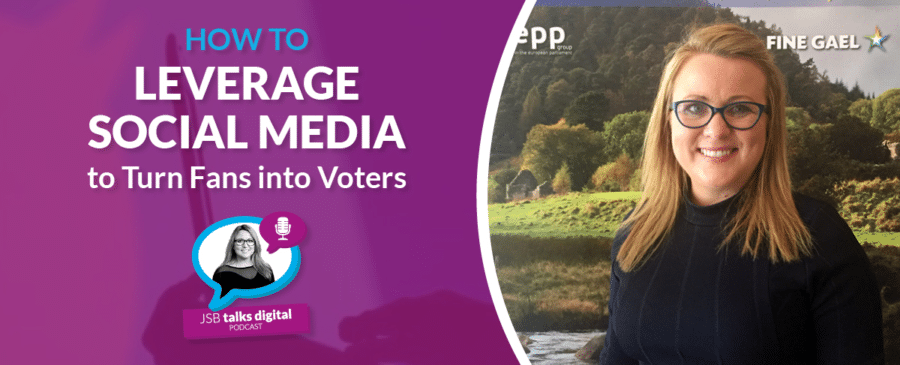How to Leverage Social Media to Turn Fans into Voters | JSB Talks Digital Podcast

JSB Talks Digital is a weekly digital marketing and social media podcast hosted by author, strategist, consultant, speaker and trainer Joanne Sweeney-Burke. Each Friday Joanne shares her digital marketing and social media insights from her work as CEO of Digital Training Institute.
In this episode I talk about the role social media plays in political communications. In a week where France elects its youngest ever President, I pose the question: Is digital communications revolutionizing electioneering as we know it?
Coming up in this podcast:
- In social media news, Facebook Reactions now available in comments; new research reveals the uniqueness of Snapchat user; and you can now search Twitter for emojis;
- I speak to politicians about the role social media plays in political communications;
- In shout-outs: Three political case studies – good and bad;
- My listeners Ask JSB and I answer their questions on air;
- In JSB’s column – How to campaign, convert and conquer by leveraging social media to turn fans into voters; and
- The tool that saved my working week.
Social Media News
Facebook Reactions are now available in comments
In an exciting development, Facebook users can now react to comments with emojis. The feature allows users to react quickly to discussions under user’ posts and status updates with the Like button and now with Reactions – ‘Love’, ‘Haha’, ‘Wow’, ‘Sad’ and ‘Angry’.

To reply to a comment with one of the emojis, all users need to do is hover over the Like button directly below the comment and wait for the faces to appear.
Previously, users could either Like a comment or reply to it with text or an image.
Facebook first introduced its Reactions emoji a year ago, but back then, users could only use them on posts and updates, not comments.
They’ve since landed on Messenger too, where they work in the exact same manner.
New research reveals the uniqueness of Snapchat audiences
It looks like Snapchat users are a unique audience and many cannot be targeted by Facebook or Instagram. New research has looked at cross-app usage between Snapchat and the other top social apps.
Overall, the most overlap occurred with Facebook’s main apps: Facebook, Instagram and Messenger.
New research by App Annie Intelligence has revealed that on any given day in the US, 35% of Snapchat’s daily users cannot be reached by Facebook, 46% can’t be reached by Instagram and 58% can’t be reached by Messenger.
As marketers we should be taking notice that a significant number of Snapchat users are not using Facebook on a daily basis.
The lesson from this research is that a one platform fits all strategy will not win over the high-spending, highly influential Gen Z demographic who want a more personalized social media experience.
You can now search Twitter for emojis
I really don’t know how this latest social media feature update is going to add value to marketers, but you can now search Twitter for emojis.
A quick search for random emojis revealed random tweets and lots of spam!
If we are to use this new feature strategically should we have bespoke groups or pairs of emojis that we tell our followers to use to share, engage or promote a particular conversation.
However, I can see one clear benefit Because of Twitter’s 140-character limit emojis can be helpful as an emoji can replace a whole word.
Interview | MEPs
In today’s show I speak to MEPs at the EPP Bureau Meeting in Wicklow about the role of social media in political communications.
Tune in to the podcast to listen to their answers to my questions.




 Ask JSB
Ask JSB
Ask JSB brings the voices of my listeners onto the show. So you now have an opportunity to ask me a question, have it aired on the podcast and I will respond.
Do you want to ask JSB a question?
If you want to hear your voice on JSB Talks Digital simply log on to digitaltraining.ie/askjsb and you might find yourself and your question on air!
Shout-Outs
In this part of the show I give shout-outs to brands, organisations and individuals whose work online is remarkable and worth talking about.
In today’s show I’m sharing three political social media case studies.
************
President Trump’s First 100 days in office in emojis
Emoji marketing is a thing, if you hadn’t already realized it by now.
Social media analytics software company Talkwalker released an infographic charting President Trumps first 100 days in office in emojis!

Using Talkwalker’s Emoji Theme Cloud, they show how people reacted throughout his first few months in office.
When it comes to elections and voting, the world is no stranger to social media conversations. Brexit, the new US president and, most recently, the French elections have all been met with astounding levels of discussion online.
Using the Talkwalker social media analytics tool, the search term “Trump” generated a staggering 67 million results in the last 30 days, and in a normal week, @realDonaldTrump racks up more than three million mentions on Twitter.
So Trump has an undeniably gigantic influence, and his tweets are a much more immediate way of communicating than whatever structures were in place before he took the stage.
************
A bad joke is always bad especially on social media
It’s not that you can’t or shouldn’t include humour in your social media posts. That does work, as former US President Barack Obama demonstrated. It’s that you should not do so if there is no other point to the post.
You’d think a PR executive would know better, but Justine Sacco turned her life upside down with one seriously un-thought-out tweet. Words can’t do justice in describing this, so here is the tweet that started the whole fiasco:

It wasn’t smart, but she did later explain (quite well) that the post was intended as a joke against the widely held racist beliefs about Africans and AIDS.
In an interview with Jon Ronson for his book So You’ve Been Publicly Shamed, Sacco explained: “Only an insane person would think that white people don’t get AIDS. I thought there was no way that anyone could possibly think it was literal… Living in America puts us in a bit of a bubble when it comes to what is going on in the third world. I was making fun of that bubble.”
Unfortunately, though, many people did take the comments literally, and so the tweet rapidly went viral. Leading to this:

Being on and 11 hour flight, Justine had no idea of the drama that was unfolding in Cyberspace. After all, her account had only 127 followers. After arriving in South Africa, it didn’t take long for her to discover the dreadful truth, which led to this:

But the horse had already bolted on this one. Nobody was interested in hearing Justine Sacco say she was sorry, they wanted her to be sorry:

In the end, it’s probably safe to assume that she is sorry, and the reaction was probably overly harsh, especially since she wasn’t an important or influential person in the eyes of many at that time. Her comments were stupid, but wouldn’t have had much impact if people hadn’t relentlessly re-tweeted them.
Talking about his book topic, Jon Ronson said: “I also began to marvel at the disconnect between the severity of the crime and the gleeful savagery of the punishment. It almost felt as if the shamings were happening for their own sake, as if they were following a script.”
The bottom line here is that making jokes in person is a lot easier than making them online. Written humour, especially on the internet, is best left to professionals.
***********
Opponent’s families should be off-limits
Never use the family of your opponent as pawns in a political attack, as it’s not only unethical, not only unfair, but it can backfire on you badly. Here’s an example from Trump that was roundly condemned, and also one of the rare occasions where he actually backed down:

If it’s not clear, this re-tweet insinuates that Jeb Bush’s wife is possibly an illegal immigrant and/or supports illegals, purely on the basis of her race. This was racist, defamatory, and frankly ungracious but he uncharacteristically backed down on this one.
JSB’s Column | Campaign, Convert and Conquer: How to Leverage Social Media to Turn Fans into Voters

In today’s column, I’m sharing my insights on how to campaign, convert and conquer by leverage social media to turn fans into voters.
Newlyweds – Social Media and Politics
It isn’t that the political realm and the social media universe haven’t ever met, in fact some surprising statistics from 2012 tell us that:
- 35% of social network users encouraged others to vote.
- 38% promoted political postings
- 28% posted links to political or politically-related stories.
Does anyone remotely believe that these trends have done anything but grow over the past four years? Much of that activity was apparently related to the 2012 Presidential election. Perhaps it was then that these seemingly opposite factions decided to embark in a relationship. Since then, there has been plenty of action taken by political candidates and their advisors to make a move into the social media arena. We are quickly discovering the power to transform social media fans into knowledgeable, influential and valued voters.
Campaign
The core principles of running a social media campaign really don’t vary from that of traditional political campaigns. It is still about the message, the place and the people.
The Message – The message of the political campaign is the heartbeat of the campaign, and that message doesn’t alter because it is being delivered via social media. Just as it is with traditional campaigns, a good message needs to be seen and heard. That means finding the right places, or in this case the right forums to announce that message.
The Place – What was once television commercials, mailings and billboards has now become social media platforms, messengers and personal engagement activity. The message of any campaign looking to take advantage of social media forums needs to be delivered through these channels. Simply put, if that message isn’t put in a place where people can see it, it fails. It fails to reach its listeners, and one-day potential voters…because it is all about people in the end.
The People – People elect candidates, so candidates need people. The right message that is delivered to the right place translates to victory. That means having a message that works and delivering that message to the place and in the forums that will reach them. This will position a campaign to covert them…
Convert
Talking to people is one thing, persuading, influencing and convincing people is another animal altogether. Social media has permitted such influence as a result of its very nature and design. It starts with the root of familiarity, which allows for an easier connection that can then convince and win and turn fans into voters.
Familiar – The organic, friendly and accustomed feel of social media platforms lends itself to your political message being more acceptable. Spams interrupt everything and feels like a nuisance. Even television commercials break-in to our favorite programs making them unwanted. Social media avenues are more subtle, natural to the user’s environment and are more often welcomed. That is where the opportunity for connection presents itself…
Connecting – Your campaign didn’t even have to knock on the door, it was invited in to have a cup of coffee and a minute to talk. That is the social media invitation – and that is when your message is delivered. If your message moves that person, group or organization, the potential to win voters begins to take shape. Those people were on familiar ground, you met them and connected with them – now make them care.
Convince – People vote because they care, and they care because they are convinced that they should or maybe even need to. Your message is taken to their home, your message connects with them on some level and now through the conversations, engagements and the influence afforded by social media, they can be convinced to care.
Conquer
Win the hearts and minds of your fans, talk to them and listen to them where they are – and many are on social media. There may not be a greater evidence of how effective and powerful social media is than the current U.S. President. Go check out how many followers President Trump has on Twitter alone, it begins to make sense real fast, right?
The Marketplace Model
The online marketplace is the model for every campaign, and by using the raw numbers of people online and the power of social media, e-commerce and online companies have become rivals to all. They have conquered the barrier of storefronts, of lacking tangibles and everything else.
Campaign smart, convert your fans and supporters and conquer the goals of your campaign. Contact us if you want to know more about using social media or how to tap into its potential power to help your campaign. If winning the social media universe can deliver a presidency, what can it do for you?
If you want to know more about developing a social media strategy for politics, get in touch. Simply drop me an email to [email protected]
Social Media Tool of the Week
The social media tool that saved my working week is Sentiment140.
Sentiment140 allows you to discover the sentiment of a brand, product, or topic on Twitter. The tool was developed by Standford University students.
Assessing sentiment in your social media strategy is very important.
So while auditing a Twitter account this week I used this tool to assess the brand sentiment of the profile.
You can also search by keyword for example and include the name of a politician or an opponent to view their sentiment analysis.
So how does it work?
In their university paper, Alec Go, Richa Bhayani and Lei Huang state that:
“…the results of machine learning algorithms for classifying the sentiment of Twitter messages using distant supervision. Our training data consists of Twitter messages with emoticons, which are used as noisy labels. This type of training data is abundantly available and can be obtained through automated means.”
Find out more at http://help.sentiment140.com/ – and it’s free to use.
Link to their paper: https://www-cs.stanford.edu/people/alecmgo/papers/TwitterDistantSupervision09.pdf
I love feedback
I’d love to know what you think about this episode. So please get in touch by commenting below or tweet me @tweetsbyJSB or send me a snap to jsbsnaps.
Listen: JSB Talks Digital | Episode #47
I would like to thank Eoghan Murphy aka The Galway Gamer for producing my podcast series and to Flirt FM on the campus of NUI, Galway where I am based for the use of their studio.










